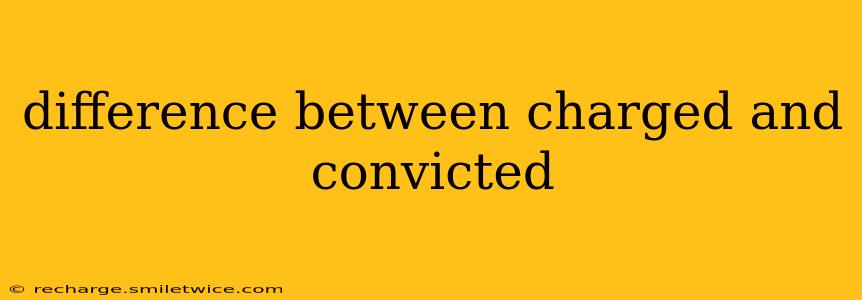The terms "charged" and "convicted" are often used interchangeably in casual conversation, but in the legal world, they represent distinct stages in the criminal justice system. Understanding the difference is crucial for comprehending how the legal process unfolds and the rights of individuals involved. This article will clarify the distinction between being charged and convicted, addressing common questions and misconceptions.
What does it mean to be charged with a crime?
Being charged with a crime means that a formal accusation has been made against an individual by law enforcement. This typically involves an arrest, followed by the filing of a formal complaint or indictment by a prosecutor. The charge outlines the specific crime(s) the individual is accused of committing. At this stage, the accused is considered innocent until proven guilty. They haven't been judged, and the burden of proof lies entirely with the prosecution to demonstrate their guilt beyond a reasonable doubt.
What does it mean to be convicted of a crime?
A conviction signifies that a court of law has found an individual guilty of a crime beyond a reasonable doubt. This occurs after a trial (or through a guilty plea), where evidence is presented, witnesses testify, and the judge or jury weighs the evidence to reach a verdict. A conviction carries significant legal consequences, including potential imprisonment, fines, probation, and a criminal record. It's the culmination of the legal process, solidifying the finding of guilt.
What are the key differences between being charged and convicted?
The primary difference lies in the legal status of the accused. Being charged is merely an accusation; being convicted is a formal declaration of guilt after a judicial process. Here's a table summarizing the key differences:
| Feature | Charged | Convicted |
|---|---|---|
| Status | Accused, presumed innocent | Found guilty |
| Legal Process | Initiation of legal proceedings | Conclusion of legal proceedings (typically) |
| Consequences | Potential arrest, bail, pre-trial hearings | Sentencing, criminal record, potential imprisonment |
| Burden of Proof | Lies with the prosecution to prove guilt | N/A – Guilt has already been established |
What happens between being charged and convicted?
The period between being charged and convicted can involve several steps, depending on the complexity of the case and the jurisdiction:
- Arraignment: The accused is formally informed of the charges against them and enters a plea (guilty, not guilty, or no contest).
- Discovery: Both sides exchange evidence and information relevant to the case.
- Pre-trial motions: Legal arguments are made regarding evidence admissibility, witness testimony, and other procedural matters.
- Trial: If a plea agreement isn't reached, the case proceeds to trial, where evidence is presented and a verdict is rendered.
- Sentencing: If convicted, the court determines the appropriate punishment.
Can someone be charged but not convicted?
Absolutely. Many cases end in acquittal (a not-guilty verdict), dismissal of charges, or plea bargains that result in reduced charges or alternative sentencing. A charge is just the beginning of a legal process, and it doesn't guarantee a conviction. The prosecution must prove guilt beyond a reasonable doubt, and the accused maintains the right to a fair trial and legal representation.
What is the difference between being charged and arrested?
While often occurring together, being charged and arrested are distinct events. Arrest is the physical apprehension of a suspect, while being charged is the formal accusation of a crime. Someone can be arrested without being formally charged, though charges usually follow an arrest. Conversely, in some cases, an individual might be charged without a physical arrest (e.g., through a summons).
Understanding the difference between "charged" and "convicted" is essential to navigate the complexities of the legal system and appreciate the importance of due process and the presumption of innocence. It's crucial to remember that a charge is an accusation, while a conviction is a legally binding judgment of guilt.
